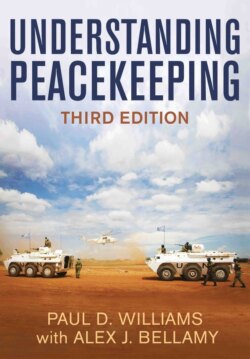Читать книгу Understanding Peacekeeping - Alex J. Bellamy - Страница 33
2.3 International organizations as peacekeepers
ОглавлениеAlthough we analyse regional peace operations in greater detail in chapter 13, it is useful briefly to highlight some of the central issues here. International organizations have initiated the majority of peace operations. While the UN has authorized the most, regional arrangements have become increasingly involved in this area, particularly since the end of the Cold War. Chapter VIII of the UN Charter encourages regional arrangements to resolve conflicts peacefully within their region, as long as they keep the Security Council informed about their initiatives. But Chapter VIII also states that regional arrangements are not permitted to engage in peace enforcement without explicit authorization from the UN Security Council. This has not stopped some regional organizations, including ECOWAS and SADC, doing precisely that.
International organizations have conducted peace operations in part because they have considerable functional and normative advantages over unilateral action (see Claude 1966; Abbott and Snidal 1998; Barnett and Finnemore 2004; Coleman 2007). In relation to peacekeeping, international organizations can play at least five positive roles.
1 They help to set the rules for the peacekeepers themselves. Contributing states should work within the organization’s agreed rules and to the mandate it provides.
2 They may provide greater accountability than unilateral actions or coalitions of the willing and offer a forum for galvanizing support and coordinating action in response to crises.
3 They maintain bureaucratic structures to manage field operations and often possess internal procedures for auditing operations.
4 In cases where the host state for the operation is also a member of the organization in question, there may be a greater inclination to accept its involvement than that of a strong regional hegemon or coalition of states.
5 International organizations may have collective institutional memories based on past experiences that can influence the development of peacekeeping norms.
However, international organizations also confront several shortcomings that may undermine their normative and functional potential. First, peacekeeping under the auspices of an international organization does not necessarily confer legitimacy on an operation. It also depends upon the organization, the historical context and the nature of the intervention itself. Second, the cost of accountability may be cumbersome decision-making processes and bureaucratic structures that are ill-suited to conducting and managing complex operations (Esman 1995: 43–7). Third, regional organizations vary considerably, not only in terms of their membership, purpose, bureaucratic structure and legitimating function but also in terms of their capabilities, role and moral standing (Acharya and Johnston 2007).
At this stage it is sufficient to note that regional arrangements have played a significant and growing role in the conduct of peace operations, especially in Europe and Africa. However, this has raised important issues concerning legitimacy, impartiality and capacity, as well as the nature of their relationship with the UN. The next section of this chapter focuses on the United Nations, which has been the single most important international organization in the realm of peace operations.
